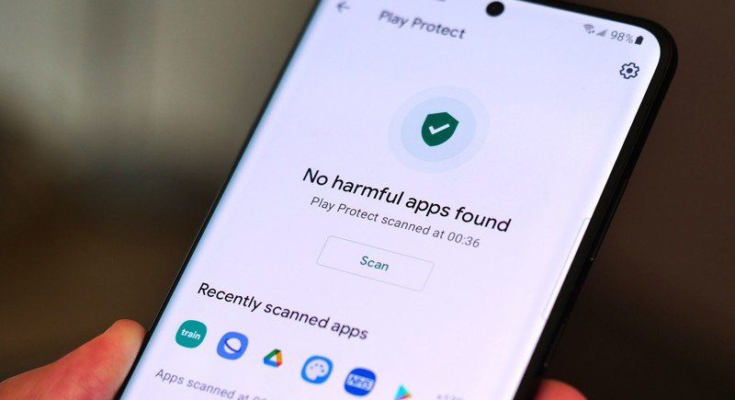Many of us have been conditioned into thinking we need to install antivirus or malware protection apps on our phones lest we become a victim of some shady group of people who want our data.
That’s bad information, which Check Point‘s recent report on alleged protection apps which steal folks’ banking information really drives home.
Yes, you read that right — apps that are listed as Android antivirus or anti-malware security software were actually stealing the banking data from users in Italy and the U.K. About 15,000 people in total were affected before the apps could be pulled from the Play Store.
Android is not a security nightmare filled with malware no matter how many times the fruity company claims it is.
Because these apps may exist in third-party app stores, I’m going to give them visibility. They all come from three developer accounts: Zbynek Adamcik, Adelmio Pagnotto, and Bingo Like Inc. If you see any applications from these developers, steer clear.
The bigger issue here, however, is that these developers were smart enough to prey on the innate FUD that has surrounded Android since day one — it’s filled with security vulnerabilities and there is malware everywhere just waiting for you to install it.
Nothing could be further from the truth.
Your Android phone can’t even get a virus
The word virus gets thrown around a lot, but did you know your Android (and iOS) phones and tablets can’t get one or pass them along?
Both can get infected by other types of malware though, so it’s important to recognize what can and can’t happen.
A virus is a bit of code that can automatically install itself, replicate itself, and pass itself along to another device without any assistance from you. Nothing on Android or iOS can be done automatically unless Google or the company that made your phone’s operating system wants it to happen.
Apps can not install themselves on your Android phone. It’s impossible.
This is because of the user/group permission model. You are a user, and as a user, you are part of a group of other users with similar permissions. the system is also a user and it is in a different group with other permissions. Every file and folder on your phone knows what users and/or groups are allowed to modify anything about it. If you do not have the right permission as a user or the right permission as a member of a group, you can’t change anything.
Some users and groups have elevated permissions, like the system level that Google or Samsung would have if you were using a Galaxy S22, for example. And if you like to tinker and have rooted your phone, you can grant yourself superuser permissions so that you can change anything you like.
No app can be installed without a user who has permission to install apps (that’s you and any other users who have signed in to your phone) saying it’s OK. Once installed, that app can only access its own data and files so it can’t copy itself somewhere else. And even if it were to get transmitted to another user, it has the same restraints on a different phone — someone has to manually tap a button that says yes when it asks to be installed.
But there are other types of malware. Usually, the malware tries to collect random data from other apps about you and then sends it back to some centralized server. This could be something that seems harmless, like which apps you have installed and how often you use them, or it could be sensitive, like your bank password. Both are dangerous.
Your phone can’t get a virus, but it can get malware if you install it.
This type of misuse of our data isn’t supposed to be possible, but there are plenty of people with bad intentions that are just as smart as the people who wrote the OS on your phone. Software vulnerabilities are common. But they are also regularly patched, which is why security updates are the most important updates of all.
This second type of malware is what smartphone users need to be concerned with, not a virus. And once upon a time, you needed to pay attention or use a third-party app to make sure you didn’t get into trouble with a bad app. But those days are gone.
You already have the right malware scanner
Unless your phone runs some fork of Android that has all things Google stripped away, you already have the malware scanner you need and it’s called Google Play Protect.
Most people think it exists to scan apps you have downloaded and installed from the Play Store, but that’s not how it works. It regularly scans every third-party application installed on your phone and reports anything fishy directly to you. If you haven’t seen a notification about a bad app, that means you haven’t had any.
Android is a lot like Windows in this regard. At one time, it wasn’t a bad idea to use a third-party malware scanning tool on either operating system. Those days are gone and both Microsoft and Google have realized that it is important to provide the needed tools themselves and keep them up to date automatically.
Google has included a malware scanner as part of its services package and that’s all you need.
Most of the time installing a second malware scanning app isn’t going to hurt anything — unless it’s a bank account-stealing trojan disguised as a security app — and there are things that Windows Defender or Google Play Protect aren’t going to consider malware.
If you want to know more about tracking cookies or personal information you are automatically sharing, using a tool to do it is needed since both Microsoft and Google don’t count that as malware. But if you’re just worried about bad apps that steal data from the best Android phone you just bought, you’re already covered.




